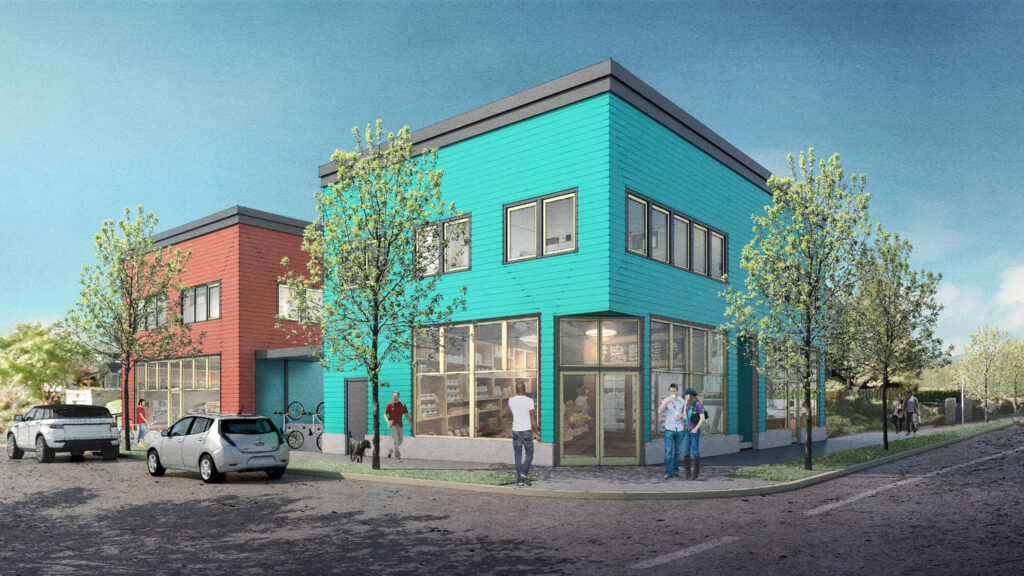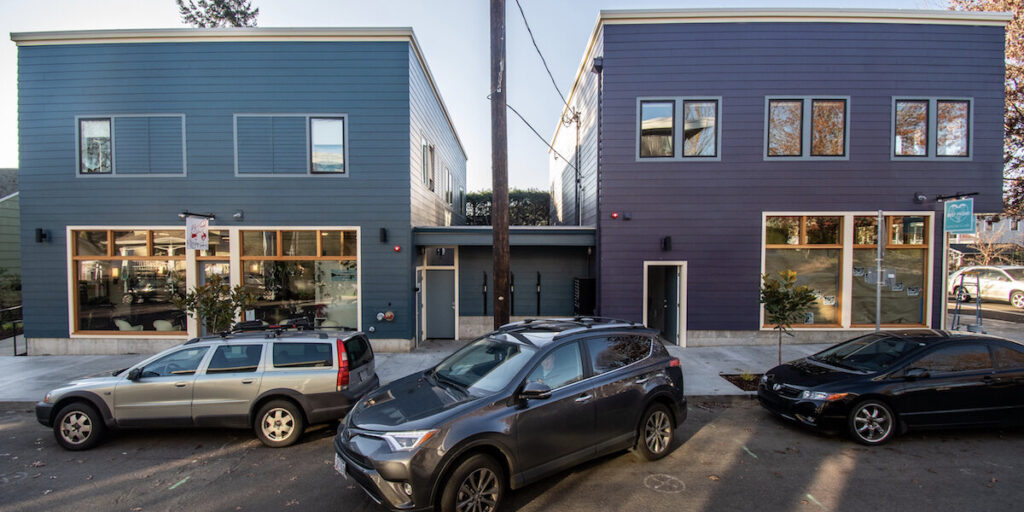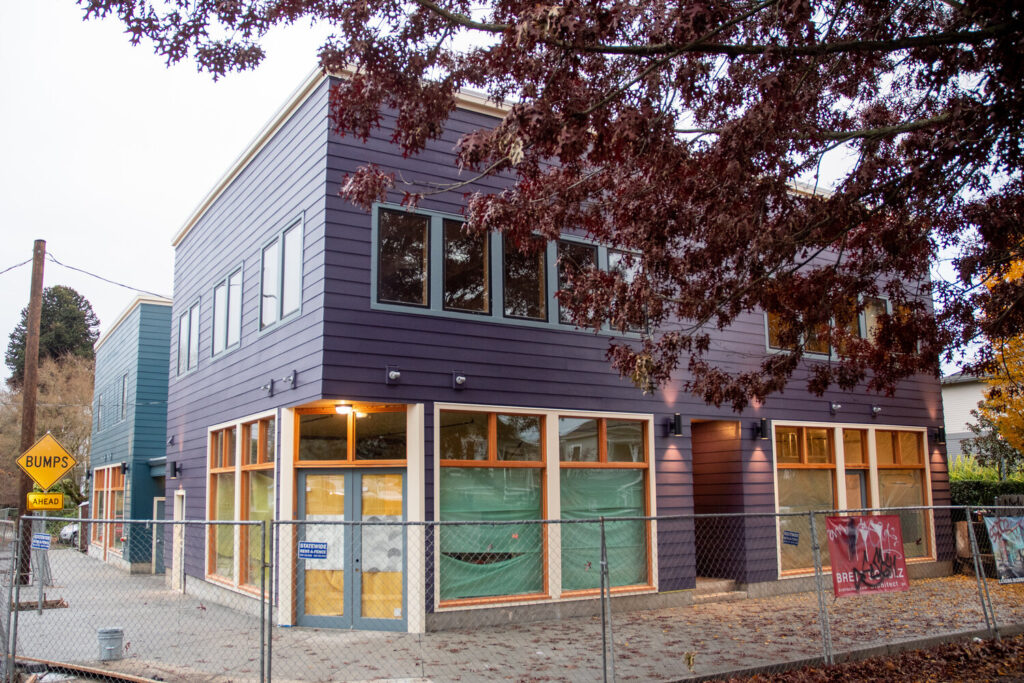Crowdfunding, Guerrilla-Style. Lessons From Jolene’s First Cousin.
See original article posted on locavesting.com. Written by Dara Westling.

When Guerrilla Development opened up crowdfunding for its latest project, a two-building mixed-use development called Jolene’s First Cousin, the team figured there would be strong demand. An earlier project, the Fair-Haired Dumbbell (they have a penchant for quirky names to go along with their iconoclastic buildings), raised $1.5 million from 121 investors in eight months, using Regulation A.
But when the Jolene campaign hit its $300,000 target in just 72 hours in late December, even its developers were surprised.
Real estate has been one of the hottest segments of crowdfunding under the JOBS Act. Most real estate crowdfunding portals have shifted to REIT-style investing, which bundles many projects into one fund.
Jolene’s First Cousin stands apart—and not just for its name (which comes from an off-color, inside joke). For one, Guerrilla Development is well known in the community and its projects suit the idiosyncratic aesthetic of Portland, Oregon, where it is based. The project is relatively modest in scale, but it has an ambitious social mission: to help address Portland’s growing homelessness problem.
Democratizing Development
Jolene’s First Cousin, which recently broke ground and is expected to be completed by early 2019, involves the development of twin two-story buildings on a single lot in the heart of the Creston-Kenilworth neighborhood in southeast Portland. It will have three ground-level retail spaces and two market rate lofts that will help subsidize the project’s 11 single resident occupancy (SRO) rooms. The SRO rooms, which will share common space and amenities and rent for $425 a month, will be filled with the help of JOIN, a Portland-based nonprofit that helps the homeless transition to permanent housing. JOIN will also hold the master lease.

The success of the Jolene’s First Cousin campaign underscores how a unique venture and vision can resonate with investors who long to be part of something meaningful—and offers lessons for others looking to crowdfund similar ventures.
Guerrilla Development is a believer in democratized development, and that extends to financing. Everyday Oregonians were able to invest in Jolene’s First Cousin under a Rule 504 exemption of Regulation D, which was qualified by the State of Oregon. (The developer considered using Oregon’s intrastate crowdfunding exemption, but that exemption limits the amount that can be raised to $250,000).
The Class B shares, paying 5% interest, were offered directly through Guerrilla Development’s web site, using back-end technology from Portland-based Chroma.
“Everyday Portlanders”
In a few short days, 43 people snapped up the shares, nearly all of them from Portland. Even with a fairly high minimum investment of $3,000, 15 of the investors were unaccredited (meaning not high net worth individuals).
The $300,000 crowd investment was just a portion of the overall capital stack for the project, which also included a small group of accredited investors and a $1.5 million construction loan.
The crowd-investors will receive an annual 5% preferred return (uncompounded) for the next 10 years. A preferred return means they’ll be paid before all Class A accredited investors, but after the bank (bank loans are always paid first). In year 10, the Class B investors will receive both the return of their principal and a percentage split of the proceeds of a refinancing event.
Guerilla plans to build more Jolene development projects— a second, third, and endless stream of “cousins.” It will continue to carve out a role for crowd-investors, even though the projects could be funded entirely by conventional means.
“We want everyday Portlanders to be able to invest in their neighborhood and to enjoy returns that are likely better than they are accustomed to,” said Kevin Cavenaugh, Guerrilla’s owner. That includes “school teachers and mechanics” who would typically be excluded from such opportunities, he said. “It’s ethically important to cast a wider net to our investor pool.”
“There is also a community empowerment component to crowd-investing. Instead of just telling someone what is going to be on their street corner, this is a chance for them to make money while being involved with the active development of their neighborhood,” added Cavenaugh.
Finally, he said, homelessness is a hugely pervasive issue in Portland, and “creating an avenue of action through crowd-investing is a way for concerned citizens to contribute to solutions (and make a profit).”

Here are some of the potential success factors and lessons learned from Guerrilla Development:
Topical Issue: Jolene’s puts a spotlight on Portland’s growing homeless problem, allowing people to invest in a tangible project, be part of a novel experiment, and use their investment dollars for social impact.
Reputation: Guerrilla is known for designing interesting spaces that are very visible in the community. It has a successful track record and a reputation for being radically transparent and creating models others can follow.
Existing Investor Pool: For Jolene’s, Guerrilla was able to tap into an existing pool of Oregon investors from its Fair-haired Dumbbell project, a popular development and well-known crowdfunding campaign. About half of Jolene’s 43 investors were also investors in the Fair-Haired Dumbbell. Those investors have already begun receiving distributions—approximately $120,000 was paid to FHD’s unaccredited investors in 2017—lending further validation.
Marketing: Guerilla’s clever and engaging marketing for FHD, along with a well-publicized campaign, may have paved the way for more efficient fundraising for JFC. Marketing is delivered via channels their audience is already in, such as sending snippets via Instagram.
Relationship with Regulators: Guerrilla’s relationship with regulators was a critical factor in the success of the offering. State regulators communicated openly and proactively and were open to reasonable ‘no-actions,’ including waiving restrictions on public advertising and general solicitation (with pre-approval of material by regulators), waiving of escrow requirements (Guerrilla instead was allowed to segregate the investment dollars in a separate bank account at an approved institution), and flexibility on the structure of the offering.
Solid Technology Partner: A good tech partner or platform is key. In Chroma, Guerrilla found a collaborative partner that customized its tech platform for Guerrilla and helped to keep costs low. It also shares Guerrilla’s ethos.
With two crowd-financings under its belt, Guerrilla Development offers lessons for others contemplating a crowdfunding campaign.
First, raising money this way is not for the faint of heart. Community investment is a cornerstone of how Guerrilla finances its projects. However, the cost of pulling together the actors is not cheap or easy. For example, it can be difficult to find a lawyer who understands or is interested in crowdinvesting regulations. (Guerrilla worked with Kyle Wuepper of Brix).
Keeping costs low enough to be viable and repeatable is challenging. At around $45,000, the cost of capital was not cheap or easy for Jolene’s First Cousin, but Guerrilla hopes it will become simpler with future raises. However, should Guerrilla decide to change the vehicle or platform, those efficiencies will not be gained.
Finally, it’s critical to have an engaged community and marketplace in order to be successful.
See more about Guerilla Development and Kevin {here}.